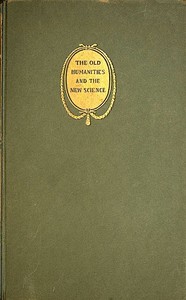The Old Humanities and the New Science by Sir William Osler
Read now or download (free!)
| Choose how to read this book | Url | Size | ||||
|---|---|---|---|---|---|---|
| Read online (web) | https://www.gutenberg.org/ebooks/48994.html.images | 116 kB | ||||
| EPUB3 (E-readers incl. Send-to-Kindle) | https://www.gutenberg.org/ebooks/48994.epub3.images | 221 kB | ||||
| EPUB (older E-readers) | https://www.gutenberg.org/ebooks/48994.epub.images | 220 kB | ||||
| EPUB (no images, older E-readers) | https://www.gutenberg.org/ebooks/48994.epub.noimages | 112 kB | ||||
| Kindle | https://www.gutenberg.org/ebooks/48994.kf8.images | 267 kB | ||||
| older Kindles | https://www.gutenberg.org/ebooks/48994.kindle.images | 254 kB | ||||
| Plain Text UTF-8 | https://www.gutenberg.org/ebooks/48994.txt.utf-8 | 95 kB | ||||
| Download HTML (zip) | https://www.gutenberg.org/cache/epub/48994/pg48994-h.zip | 235 kB | ||||
| There may be more files related to this item. | ||||||
Similar Books
About this eBook
| Author | Osler, William, Sir, 1849-1919 |
|---|---|
| Author of introduction, etc. | Cushing, Harvey, 1869-1939 |
| LoC No. | 20007592 |
| Title | The Old Humanities and the New Science |
| Note | Reading ease score: 53.8 (10th to 12th grade). Somewhat difficult to read. |
| Credits |
Produced by Bryan Ness, Ernest Schaal, and the Online Distributed Proofreading Team at http://www.pgdp.net (This file was produced from images generously made available by The Internet Archive) |
| Summary | "The Old Humanities and the New Science" by Sir William Osler is a presidential address delivered to the Classical Association in 1919 and published in 1920. This work is a scholarly essay that reflects Osler's views on the relationship between the humanities, particularly classical studies, and the burgeoning field of modern science during the early 20th century. The topic centralizes around the importance of integrating scientific progress with classical humanistic traditions in education. In his address, Osler discusses the evolving landscape of knowledge during a time marked by rapid advancements in science juxtaposed against the enduring relevance of classical humanities. He articulates a vision where both domains are necessary for a well-rounded education, emphasizing that science benefits from the ethical and philosophical perspectives offered by the humanities, while also acknowledging that neglecting scientific thought would detract from a comprehensive understanding of human culture. His reflections highlight the historical contributions of classical thinkers to modern science and medicine and advocate for a collaborative educational approach that honors both fields, asserting that the richness of the humanities can enhance the practice of science and vice versa. (This is an automatically generated summary.) |
| Language | English |
| LoC Class | LC: Education: Special aspects of education |
| LoC Class | Q: Science |
| Subject | Science |
| Subject | Classical education |
| Category | Text |
| EBook-No. | 48994 |
| Release Date | May 19, 2015 |
| Copyright Status | Public domain in the USA. |
| Downloads | 94 downloads in the last 30 days. |
| Project Gutenberg eBooks are always free! | |

